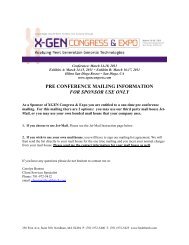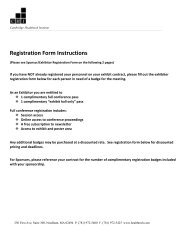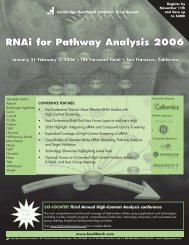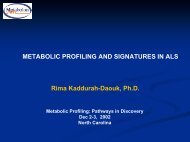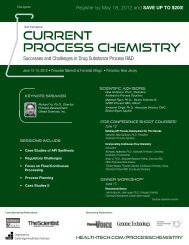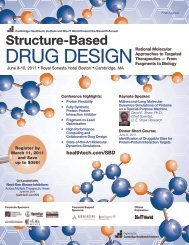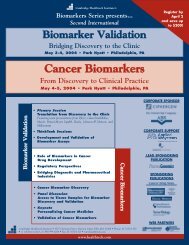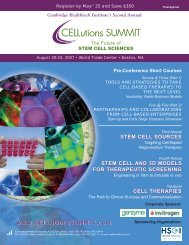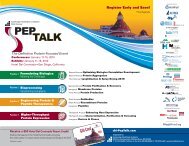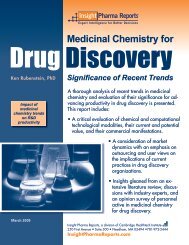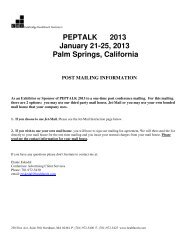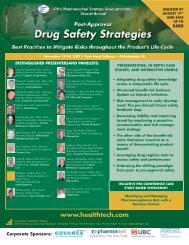2013 Applying Next Generation Sequencing Brochure.pdf
2013 Applying Next Generation Sequencing Brochure.pdf
2013 Applying Next Generation Sequencing Brochure.pdf
Create successful ePaper yourself
Turn your PDF publications into a flip-book with our unique Google optimized e-Paper software.
Cover<br />
Inaugural<br />
August 19-20, <strong>2013</strong><br />
Conference-at-a-Glance<br />
Short Courses/Plenary Keynote<br />
<strong>Sequencing</strong> Strategies for Success<br />
Dynamics of the Microbiome<br />
on Health and Disease<br />
Single-Cell <strong>Sequencing</strong><br />
<strong>Sequencing</strong> Data Analysis<br />
and Interpretation<br />
Sponsor & Exhibit Opportunities<br />
NG X Dynamics of the Microbiome<br />
on Health and Disease<br />
Communities, Composition, and Computation<br />
Advances in next-generation sequencing and computation have elucidated the impact of human genomic variation; however, the<br />
impact of this variation is largely unexplored in the human microbiome. Now clinical and environmental researchers have the<br />
high-resolution tools to explore the emergent science of microbial communities and the ecosystems they inhabit. CHI’s Dynamics<br />
of the Microbiome on Health and Disease conference focuses on understanding the role of the microbiome to offer new insights<br />
into disease processes and discovery of new therapeutic strategies.<br />
Monday, August 19<br />
8:30 am Short Course Registration and Morning Coffee<br />
database. Our results show several new potential bacterial agents that may be associated with<br />
different diseases with unknown etiologies. We are currently in the process of translating these<br />
methods to the clinic where these approaches can immediately impact human health.<br />
Hotel & Travel Information<br />
Registration Information<br />
Click Here to<br />
Register Online!<br />
Healthtech.com/<strong>Sequencing</strong><br />
Register by<br />
July 12<br />
and Save up<br />
to $250<br />
Cambridge Healthtech Institute<br />
250 First Avenue, Suite 300<br />
Needham, MA 02494<br />
www.healthtech.com<br />
9:00-12:00 pm Short Courses* (see page 3 for details)<br />
SC1: Mapping Genomes in 3D<br />
SC2: Sample Prep<br />
1:00 Main Conference Registration<br />
Communities and Composition<br />
2:00 Chairperson’s Opening Remarks<br />
Emma Allen-Vercoe, Ph.D., Assistant Professor, Molecular and Cellular Biology, University<br />
of Guelph<br />
»»<br />
Featured Presentation<br />
2:10 Metagenomic Platforms for Diagnostic, Microbial Composition and<br />
Etiologic Agent Discovery Applications<br />
Joseph Petrosino, Ph.D., Assistant Professor, Molecular Virology and Microbiology; Director,<br />
Alkek Center for Metagenomics and Microbiome Research, Baylor College of Medicine<br />
Metagenomics strategies for etiologic agent discovery and diagnostic detection have multiple<br />
advantages over past methods: they are highly sensitive; they are able to detect sub-PFU levels of<br />
viruses in clinical samples; there is no requirement for propagation of the suspected agent in the<br />
laboratory; and there is no need for prior knowledge of the agent to be detected. For suspected<br />
bacterial agents we are using 16S rRNA gene and whole-genome shotgun surveys of diverse human<br />
samples to identify potential agents and antibiotic resistance profiles. For suspected viral agents<br />
we are sequencing randomly primed cDNA libraries and querying these data against a custom viral<br />
7<br />
2:40 Archaea and Fungi of the Human Gut Microbiome<br />
Christian Hoffmann, Research Scientist, Frederic D. Bushman Laboratory, Microbiology,<br />
Perelman School of Medicine, University of Pennsylvania<br />
We investigate associations of diet with fungal and archaeal populations in the gut<br />
microbiome, as well as interdomain relationships between bacteria, archaea and fungi in a<br />
cohort of 96 individuals. Diet relationships with microbial taxa were investigated regarding<br />
usual and recent dietary intake.<br />
3:10 Microbial Ecosystems Therapeutics: A New Paradigm in Medicine?<br />
Emma Allen-Vercoe, Ph.D., Assistant Professor, Molecular and Cellular Biology, University<br />
of Guelph<br />
It is now clearly recognized that the human gut microbial ecosystem is a critical factor in the<br />
maintenance of host health, and that disturbances in this ecosystem, leading to enduring<br />
imbalance (dysbiosis) are associated with an ever increasing number of disorders (for example,<br />
IBD, IBS, diabetes, asthma, autism). With this in mind, is it possible to harness the microbial<br />
Alumni Discount SAVE 20%<br />
Cambridge Healthtech Institute (CHI) appreciates your past participation at our events. Through<br />
loyalty like yours, CHI has been able to build this event into a must-attend for senior-level<br />
decision makers. As a result of the great loyalty you have shown us, we are pleased to extend<br />
to you the exclusive opportunity to save an additional 20% off the registration rate. Just check<br />
off the box marked Alumni Discount on the registration form to receive the discount!<br />
>>



